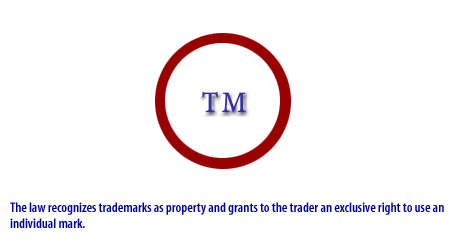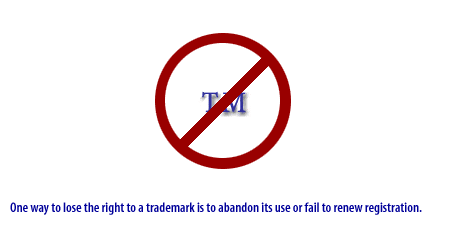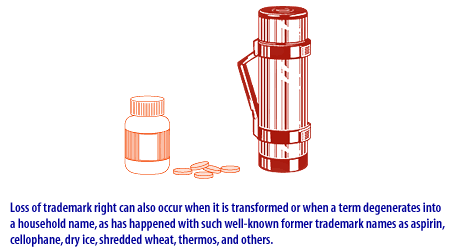| Lesson 4 | Trademark |
| Objective | Define trademark and review trademark issues. |
Trademark Challenges
Under common law and the U.S. Lanham Act, a trademark is "any word, name, symbol, or device or any combination thereof adopted and used by a manufacturer or merchant to identify his goods and distinguish them from those manufactured or sold by others."
- Trademarks
Trademarks originate from the rule that no one has the right to sell products that belong to another person or company.
The following series of images below discusses trademark issues in more detail.
Trademark Issues



Domain Name Infringements
A direct contribution of EP to trademark law concerns domain name infringements. A domain name is a company's logical address or source identifier on the Internet.
The holder of a domain name may be entitled to protection by the U.S. Patent and Trademark Office (PTO) if the domain name also functions as a trademark or service mark.
- Intermatic, Inc. v. Toeppen:
Several domain name infringement suits have been brought to the attention of the courts:
Intermatic, Inc. sued Dennis Toeppen to cease and desist using the domain name intermatic.com. The court ruled in 1996 that,
". . .by registering intermatic.com as a domain name and attempting to sell or license the name to the owner of the famous Intermatic trademark, diluted that mark under the law, since traditional trademark law applies even though the Internet is a new medium of communication..."
Plaintiff Intermatic Incorporated is the owner of the federal trademark "Intermatic," which it uses to sell a wide variety of electronic products. The defendant is a resident of Illinois referred to by the court as a "cyber squatter" or someone that buys domain names. The defendant registered the domain name "intermatic.com" without the plaintiff's permission on which he ran a web site featuring a map of Champaign-Urbana. The court determined that the site was not used to advertise or sell any products. The defendant admitted that he had registered the domain name for the purpose of selling the domain to the plaintiff. When the defendant refused to voluntarily relinquish the domain name to the plaintiff, this suit followed.
Plaintiff charged that defendant's conduct constituted federal trademark infringement and unfair competition, as well as a violation of the federal trademark dilution act. In addition, the plaintiff asserted that defendant's conduct fell under the Illinois Antidilution Act, Uniform Deceptive Practices Act and Consumer Fraud and Deceptive Business Act, and constituted common law unfair competition.
Software Patents
Summary Judgement
In law, a summary judgment (also judgment as a matter of law) is a judgment entered by a court for one party and against another party summarily, for example without a full trial. Such a judgment may be issued on the merits of an entire case, or on discrete issues in that case.
The parties cross-moved for summary judgment and the court recommended that the plaintiff's motion with respect to the antidilution claims be granted. The court determined that defendant's conduct violated the state and federal anti-dilution statutes.
In order to establish such a claim, the court stated that plaintiff must show that its mark is famous (which was conceded) and that the defendant is engaging in a commercial use of the mark in commerce which is causing prohibited dilution of the mark.
The court concluded that defendant's use of the mark was commercial even though the website featured nothing more than a map and sold no products. The use of the mark in a URL with a .com top level domain name did not mandate such a finding.
However, "Toeppen's intention to arbitrage the 'intermatic.com' domain name constitutes a commercial use.
As far as dilution is concerned, the court concluded that "the fact that intermatic.com will be displayed on every aspect of the web page is sufficient to show that Intermatic's mark will likely be diluted." Dilution is intended to prevent the association of plaintiff's mark with anything it does not want it associated with, even something as harmless as a map of Champaign-Urbana Illinois.
The Magistrate Judge recommended that the parties' cross motions with respect to all other claims be denied. The court concluded that there were issues of fact as to whether defendant's use of intermatic.com in a noncommercial site would cause a likelihood of consumer confusion. This is a prerequisite to the trademark infringement, unfair competition, and deceptive practice claims. The court, in reaching this conclusion, noted that no evidence of actual consumer confusion had been presented. The plaintiff was not operating a web site and the defendant was not selling any products. Furthermore, there was a question of fact as to whether the surfers who typed "intermatic.com" and found a map of Champaign-Urbana would associate it with the plaintiff.
Toeppen's desire to resell the domain name is sufficient to meet the 'commercial use' requirement of the Lanham Act."
As far as dilution is concerned, the court concluded that "the fact that intermatic.com will be displayed on every aspect of the web page is sufficient to show that Intermatic's mark will likely be diluted." Dilution is intended to prevent the association of plaintiff's mark with anything it does not want it associated with, even something as harmless as a map of Champaign-Urbana Illinois.
The Magistrate Judge recommended that the parties' cross motions with respect to all other claims be denied. The court concluded that there were issues of fact as to whether defendant's use of intermatic.com in a noncommercial site would cause a likelihood of consumer confusion. This is a prerequisite to the trademark infringement, unfair competition, and deceptive practice claims. The court, in reaching this conclusion, noted that no evidence of actual consumer confusion had been presented. The plaintiff was not operating a web site and the defendant was not selling any products. Furthermore, there was a question of fact as to whether the surfers who typed "intermatic.com" and found a map of Champaign-Urbana would associate it with the plaintiff.
Kaplan v. Princeton Review
Stanley Kaplan, the owner of various standardized testing preparation courses, sued competitor Princeton Review over Princeton's use of the domain name kaplan.com. Kaplan alleged that such bait-and-switch tactics appropriated the goodwill and recognition associated with Kaplan's trademark, service mark, and trade name. The dispute eventually led to an out-of-court settlement and a change of domain name by Princeton.
The next lesson will cover patents and patent issues.
- The role of the Patent and Trademark Office (PTO):
The Patent and Trademark Office (PTO) may deny federal registration of a domain name if the mark is likely to be confused with a previously registered trademark or service mark. The test for confusion is based on the likelihood with which an average consumer in a similar marketplace would confuse the source of the product or services given similarities in sound, appearance, meaning, or connotation of the two marks. - Domain Name Registration:
Domain name registration is done on a first-come, first-served basis without examining whether the proposed name would violate anyone else's proprietary rights. The problem with the first-to-file approach arises when the domain name will also function as a trademark or service mark. If a domain name is challenged by another individual or organization as an infringement under trademark or service mark law, the registration service will place the domain name "on hold" to make it unusable by anyone until the matter is resolved.
The next lesson will cover patents and patent issues.